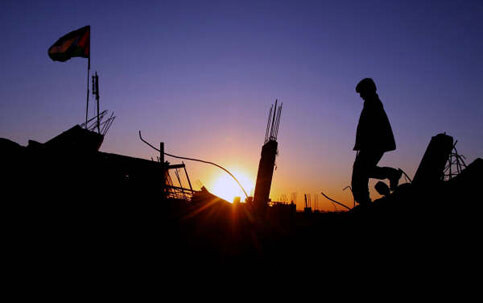Gaza Strip 10 February 2009

A boy walks on the rubble of a destroyed home in the Gaza Strip. (Eman Mohammed)
Since Israeli missile savagery first hit Gaza, everything started to become blurry to me. My vision was totally unclear — all the horrible events went in slow motion as if I was watching a horror movie, but the most realistic one I’ve ever seen.
My biggest fear was losing a loved one.
After 21 indescribable days, “the war was over,” or so they said. But it wasn’t for me; enormous destruction covered the beautiful face of Gaza that I knew. Thousands of houses and buildings were wiped off the earth. Three weeks were all that Israeli warplanes and tanks needed to smash so many living creatures in Gaza including babies — even unborn ones — women, children, men and the elderly.
I wandered among the rubble of houses and the remains of lives for more than I can remember. I couldn’t find the words or photographs to convey how much pain the people feel. Somehow they still manage to get up every morning. They search for a new start, to begin their lives again, or they search for remnants of the old life — maybe a tattered family picture that was so precious to them.
Like the teddy bear with the ripped-off head which belonged to four-year-old Samar Abed Rabu who was hit three times in her chest and went abroad for treatment. Her father Khaled was clinging to it waiting for his baby girl to come back and get it after he lost her other two sisters Suad, seven, and Amal, two, in front of his eyes. Samar’s broken teddy bear was the only thing that managed to comfort him.
A similar tragic loss, but a different time and place, was Manal al-Samouni’s story. She was sitting near the remains of her destroyed house waiting for her brother’s four children to return from visiting their father’s grave. They lost him after he was injured while bravely rescuing his family. For four days he bled to death. This is their memory of their heroic father, Manal said.
Muhammad Balousha, age two, waited constantly by the door listening carefully to the sounds around him, hoping to recognize the sounds of his five sisters coming home. He does not know that on that one night they said goodnight and went to sleep, it was forever.
These were some of the stories I got emotionally involved with and maybe because of that I broke the first rule of journalism which is supposedly to stay professional, not to get involved. Whether I took photos, delivered a message, or whatever I was supposed to be doing, I did it all while watching my soul slip away, not being able to hold onto it or let it go, as if I were falling into a coma. I did not see this war coming even in my worst nightmares and I can’t feel that it has gone because all that is left are lifeless bodies whether they are under the ground or still breathing above it.
The silence in Gaza is too loud, too bare. Words don’t seem to ease the pain or heal the wounds. The shouts are gone without an echo, but Gaza’s people still managed to get up from under the rubble and the torn memories. My people proved to me once again that they are stronger than these attacks and invasions. They have vanquished death by rebuilding their lives time after time. Maybe that’s something I’ll never be able to understand or do myself, since the day they stabbed Gaza, my soul was stolen by an evil force. I believe it was a war on Gaza, not in Gaza as they claim. Their attacks were barbarism, but Gaza managed to survive, one way or another.
Eman Mohammed is a Jordanian-Palestinian freelance photojournalist and reporter based in the Gaza Strip since 2005.
Related Links




